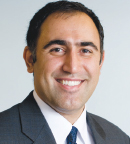Amir T. Fathi, MD, an oncologist at the Massachusetts General Hospital Cancer Center and Assistant Professor of Medicine at Harvard Medical School, Boston, commented on the INO-VATE ALL trial for The ASCO Post. “It has been a fairly exciting time for patients with acute lymphoblastic leukemia (ALL). There are a series of novel approaches, many of them immunologically based—such as the antibody-drug conjugate inotuzumab ozogamicin and the bispecific T-cell engager (BiTE) antibody blinatumomab (Blincyto)—emerging as effective therapies for these patients,” he noted.

Once patients develop relapsed/refractory disease, our goal is to get eligible patients into remission and on to transplant, which provides them with a potentially curative modality.— Amir T. Fathi, MD
Tweet this quote
Inotuzumab ozogamicin targets CD22, and blinatumomab engages CD19. “It’s important to mention that the large majority of ALL cells express CD22,” he said. No studies have yet compared these two drugs for efficacy in ALL. The drugs also have different toxicity profiles, he added.
The results of the current study of inotuzumab ozogamicin are “impressive and quite promising,” commented Dr. Fathi, who emphasized that among the benefits of inotuzumab may be its ability to get more patients to stem cell transplantation. “Once patients develop relapsed/refractory disease, our goal is to get those eligible into remission and on to transplant, which provides them with a potentially curative modality,” he said.
Veno-occlusive Disease
He added that veno-occlusive disease is a concern with inotuzumab ozogamicin, but in other clinical trials, which excluded patients with prior transplant, the rates of veno-occlusive disease have been lower. “It does appear that prior exposure to allogeneic transplant or to certain conditioning regimens or schedules may predispose certain patients to developing this serious condition,” he said.
The publication discusses the possibility that certain aspects of conditioning regimens may impact the development of veno-occlusive disease, and more information on this will be helpful to clinicians, he said. “Certainly, if we can ameliorate this in some fashion, it will help our patients who will receive this drug,” he said. ■
Disclosure: Dr. Fathi reported no potential conflicts of interest.

